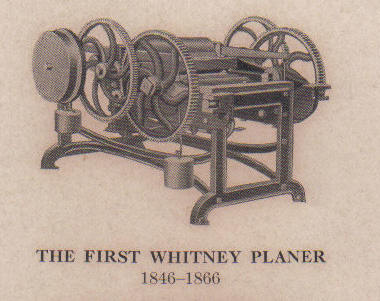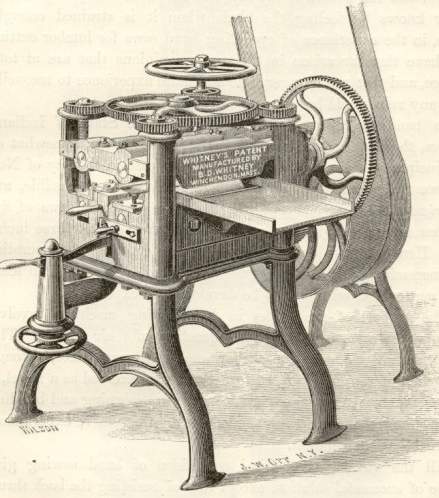Baxter D. Whitney purportedly invented the rotary surface planer in 1837, which was introduced to the market in 1846. He made only single- and double-sided surface planers, avoiding the planer-matcher and four-sided planer markets controlled by the Woodworth patent monopoly.

Image courtesy Newman Machine Co.
Around 1857 a fixed-knife planer and a fixed-knife scraper were introduced that produced a better surface than the roughly scalloped surface of the rotary planers of the day (their wooden frames and crude bearings were insufficiently rigid to create a reasonably smooth surface using a cylindrical cutter-head). With the collapse of the Woodworth monopoly in 1856, however, rotary planers quickly improved and the fixed-knife planer never achieved much success. Whitney evolved his planer designs to have rigid cast-iron frames, heavy cutterheads, pressure bars, and other features aimed at producing quality finishes on hard woods. Other machines were introduced over the years, including spindle shapers, but planers remained the primary product line.

From "A Treatise on the Construction and Operation of Wood-Working Machines" by John Richards, 1872.
Baxter Whitney died in 1915, aged 98. After the son, W. M. Whitney, died in 1953, the family sold the company to Newman Machine Company in 1955.
Many machines are branded, simply, "Whitney".
Other Information
The Whitney section of the VintageMachinery wiki contains additional material on Whitney, including how to date your Whitney machine based on its serial number, plus there is a history of the Baxter D. Whitney Company reprinted from the January, 1957, issue of The Wood-Worker.
Information Sources
- Chandler Jones' "Planers, Matchers & Molders in America" gives a history of the company.
- A 1920 ad in The Wood-Worker shows their new direct-drive vertical boring machine.
- A three-page ad in 1955-56 Hitchcock's Wood Workers Digest Directory (HWWDD, published in 1954) introduces a new six-roll single surfacer and a new spindle shaper. An ad in 1964 HWWDD makes no mention of Newman. There was a line of vocational machinery that was distributed by Yates-American.